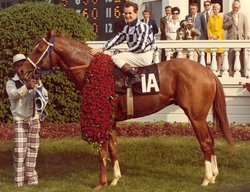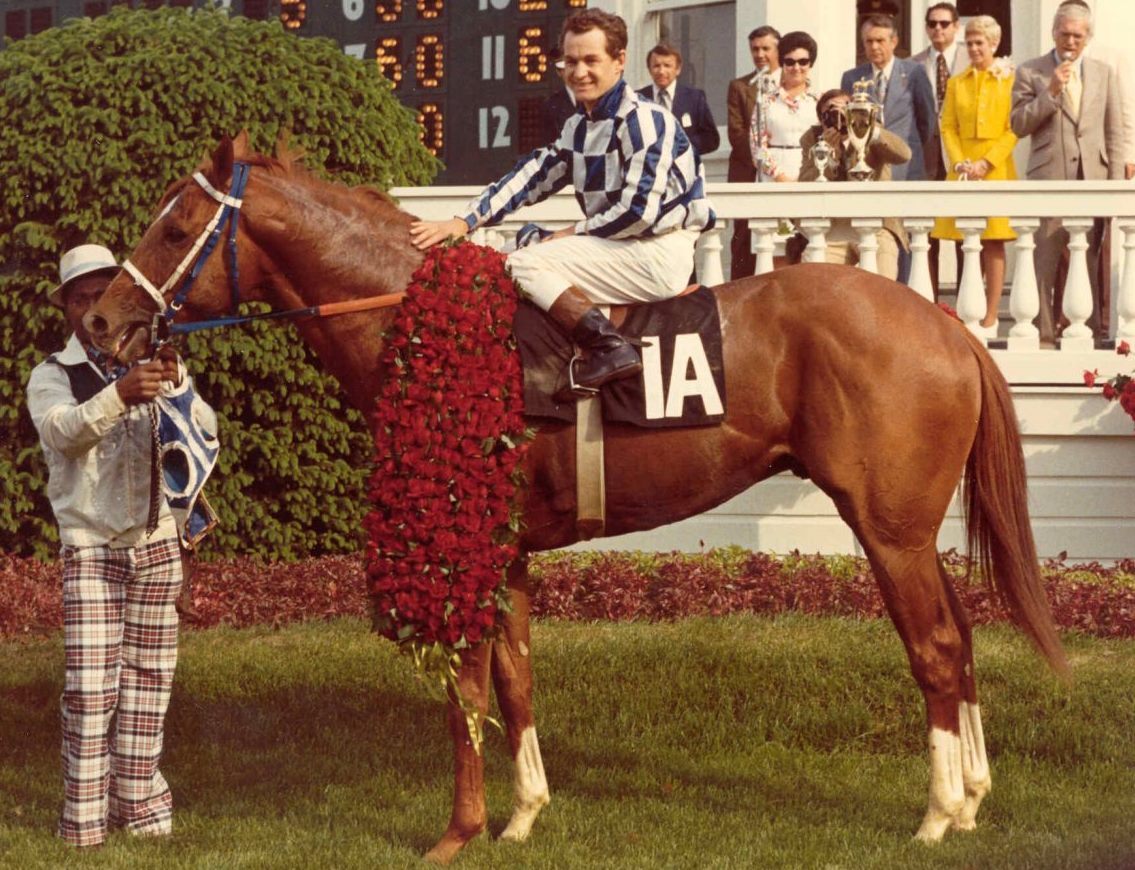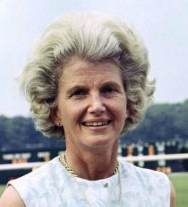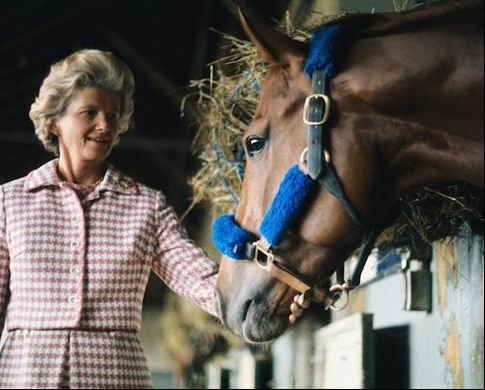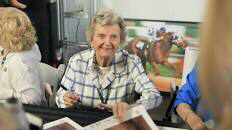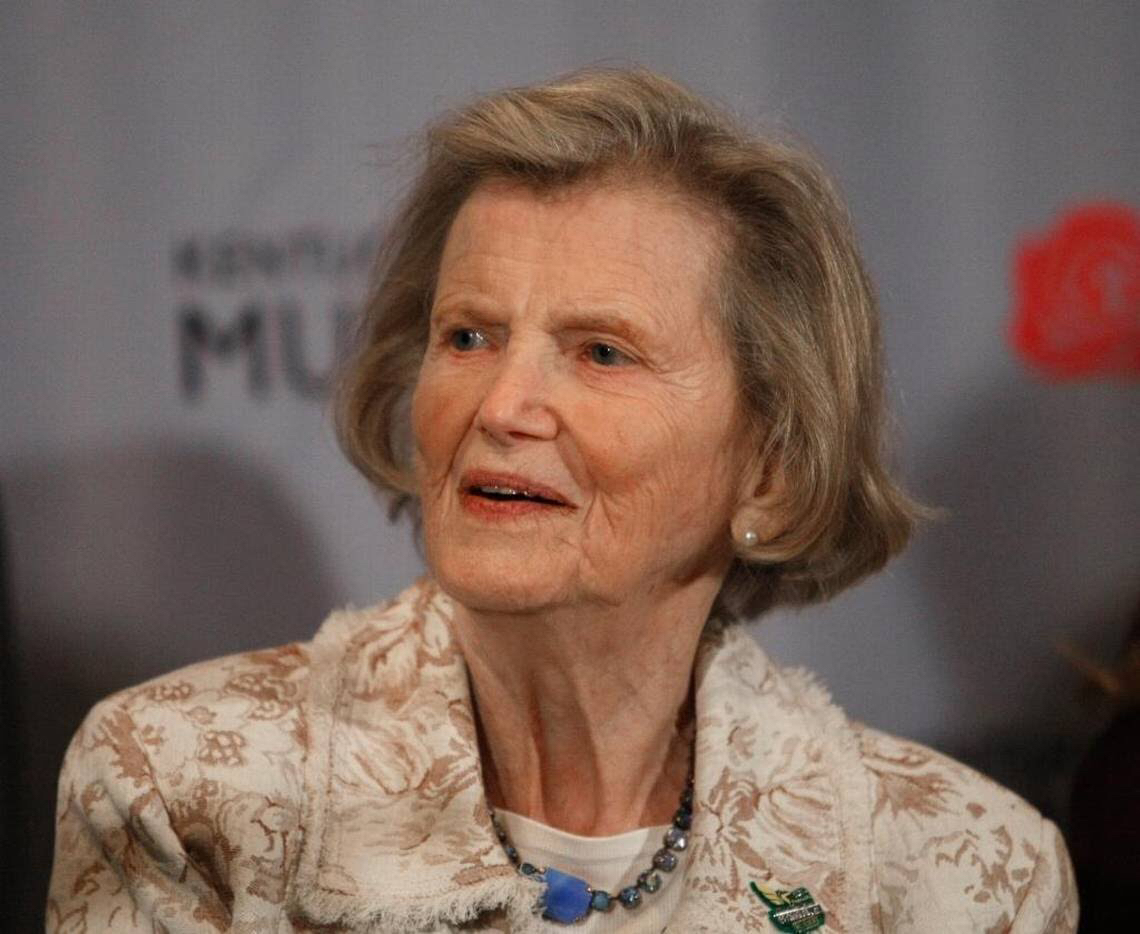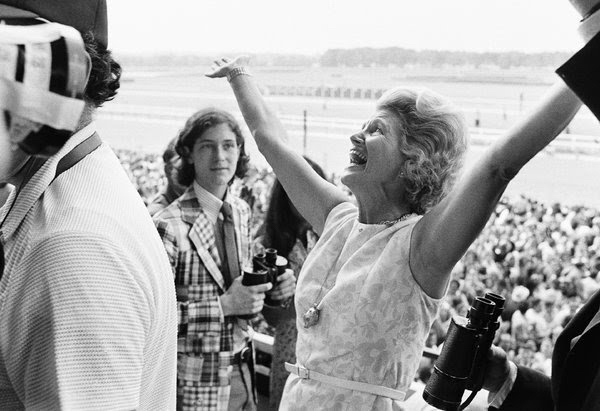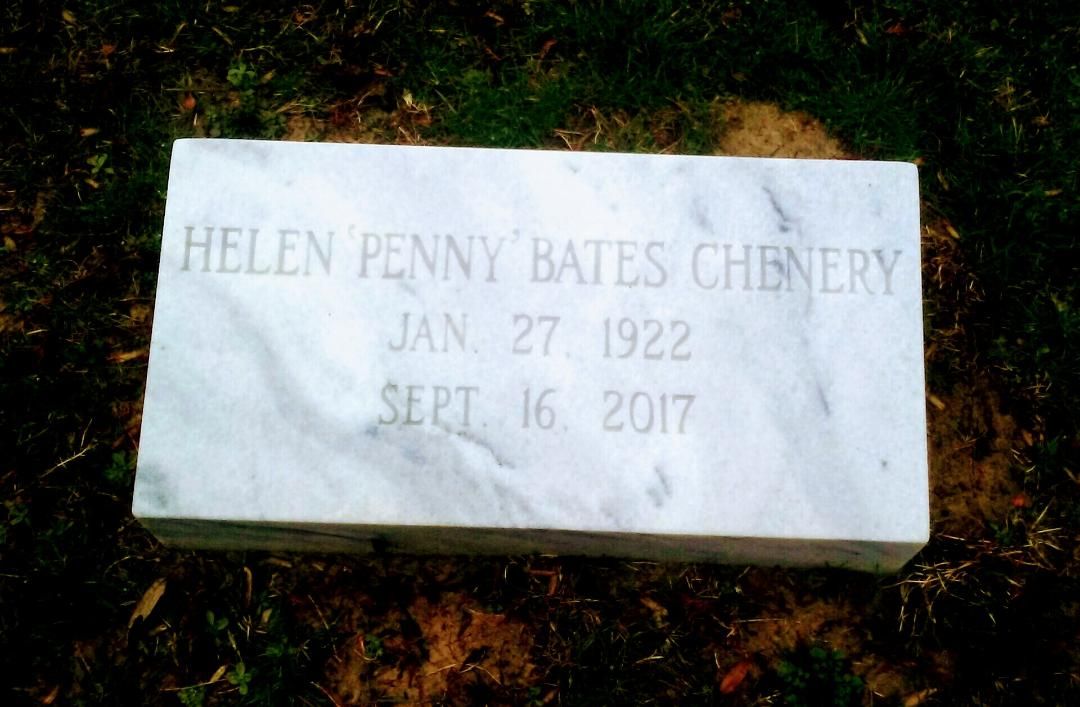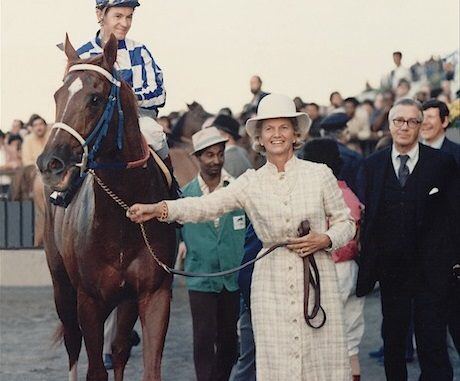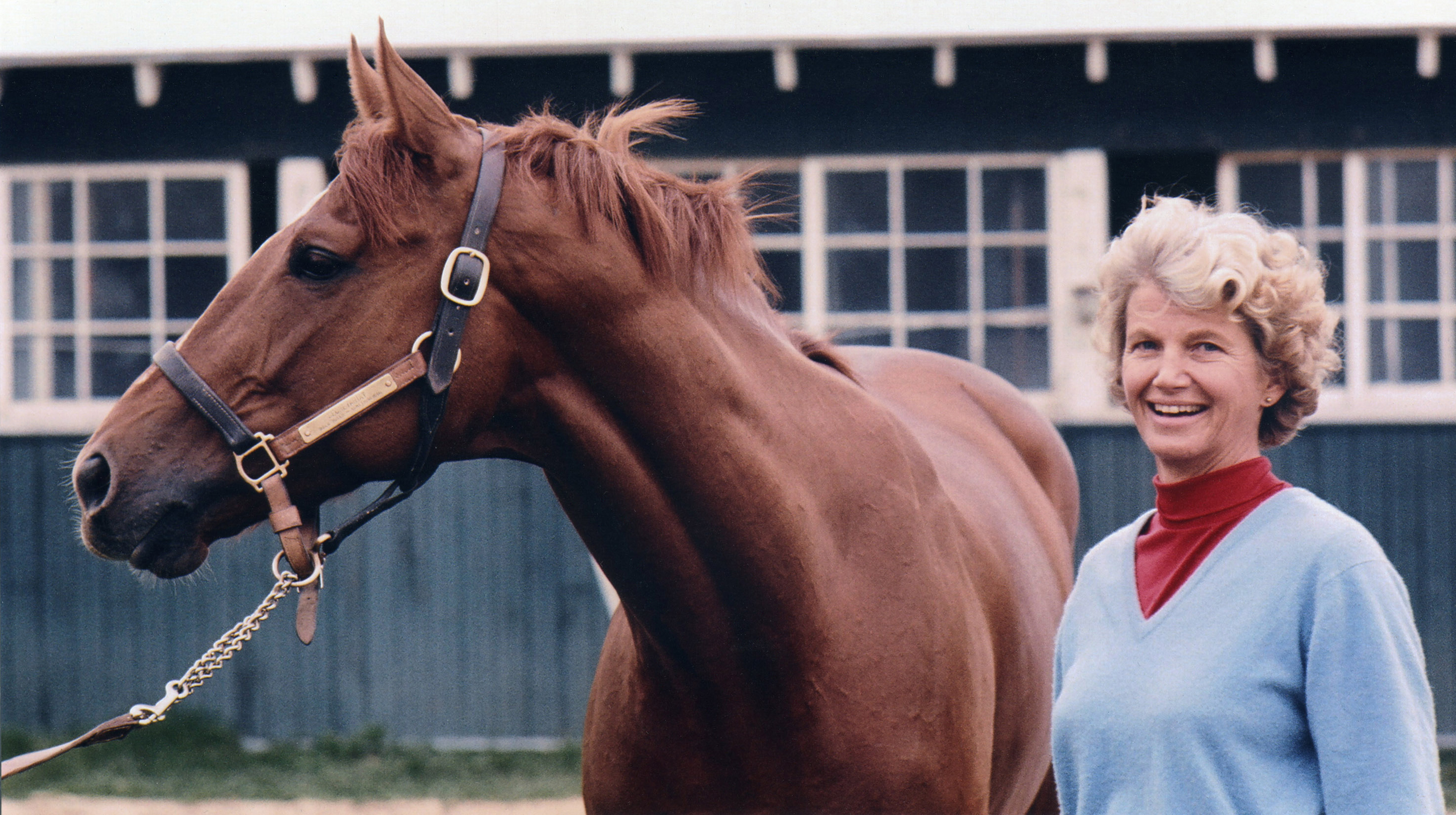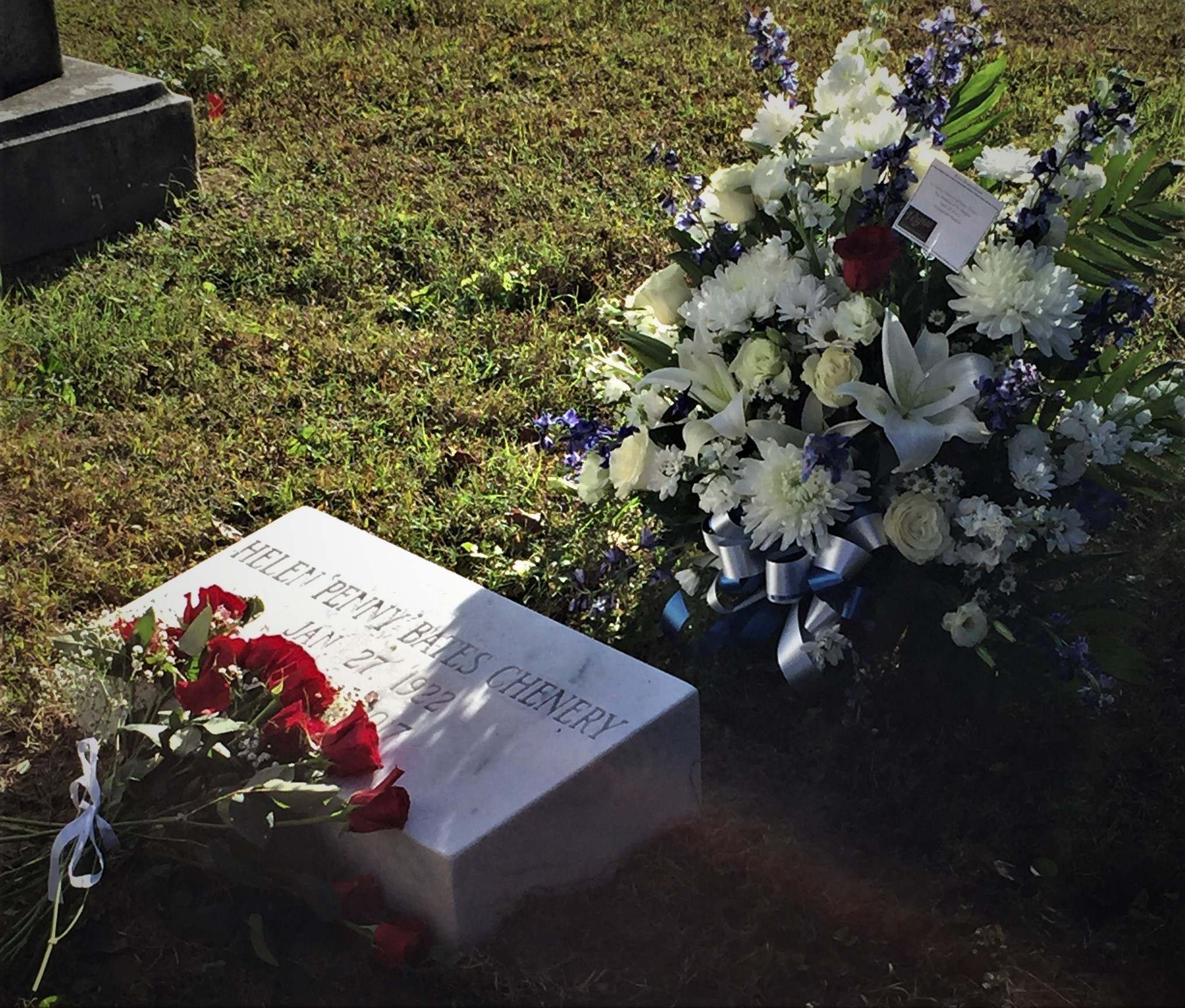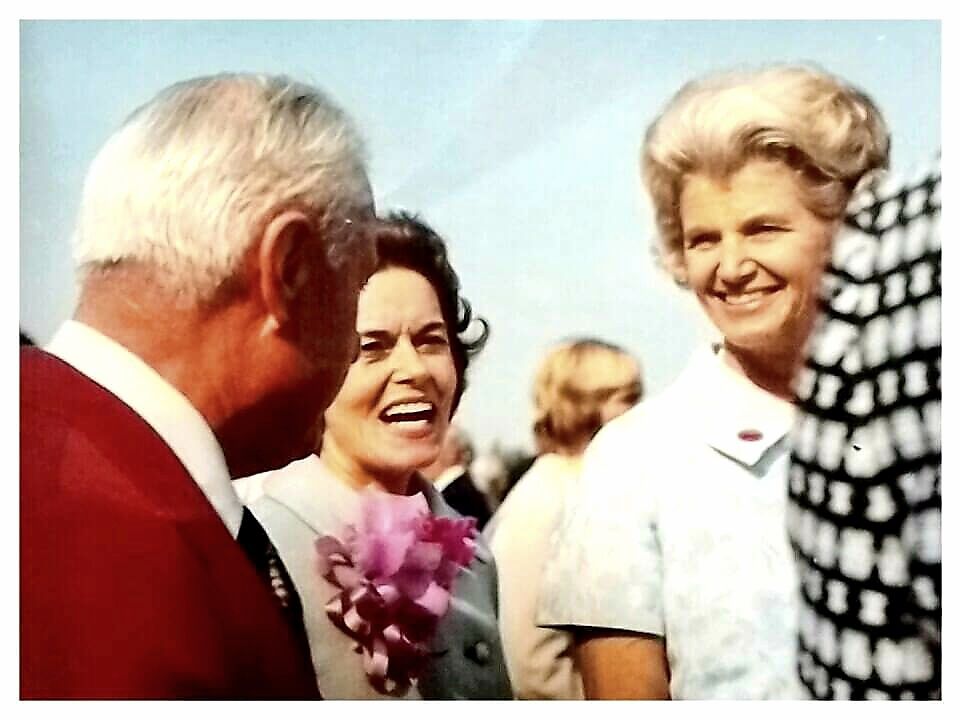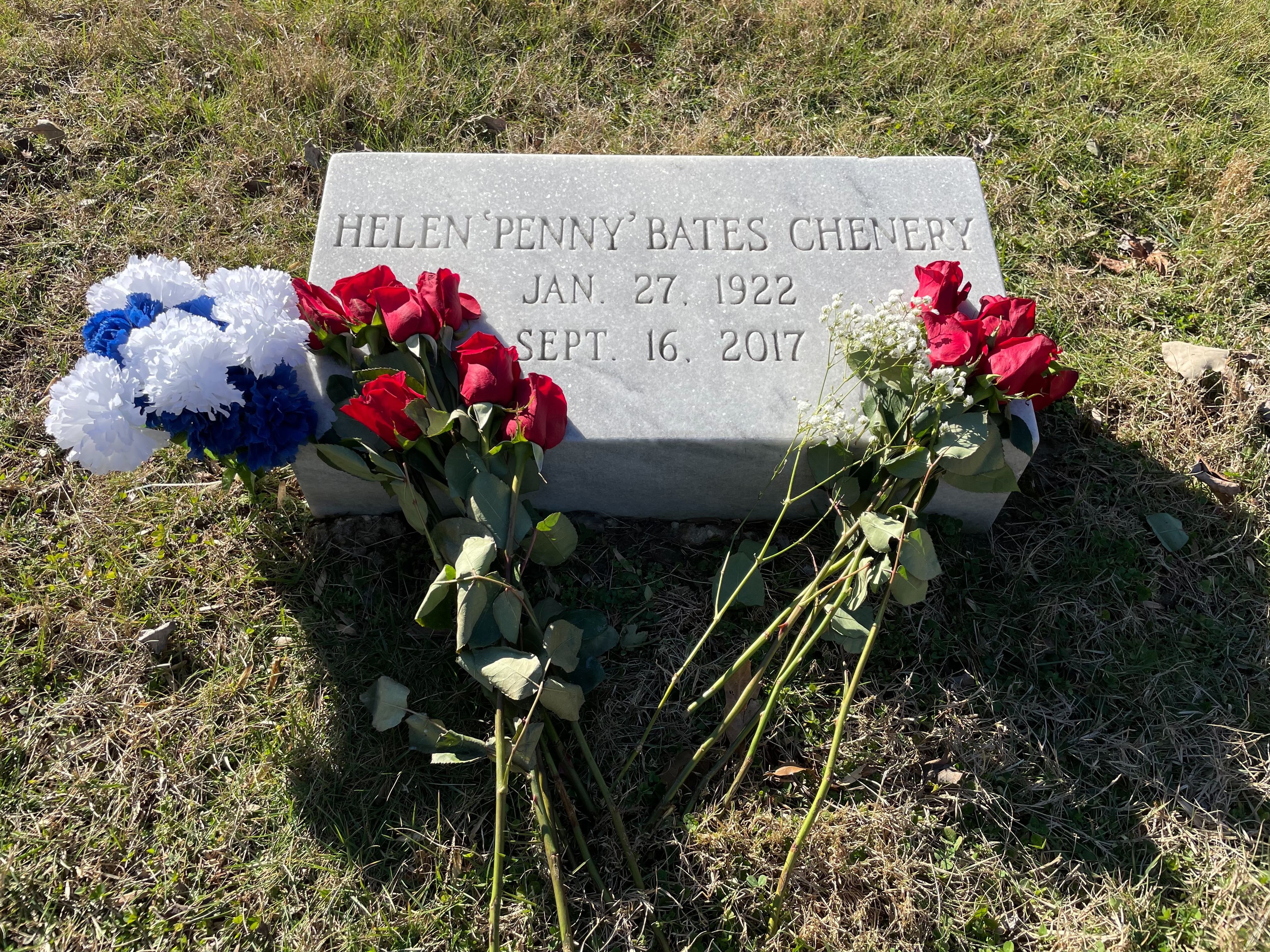Her death was announced by her family.
When Secretariat won the Kentucky Derby, the Preakness and the Belmont Stakes in 1973, capturing the Belmont by an astounding 31 lengths, he was a national celebrity. He appeared on the covers of Time, Newsweek and Sports Illustrated and attracted thousands of fan letters.
When Secretariat died at 19 in 1989, Ms. Chenery, who oversaw his fortunes as the manager of her family’s Meadow Stable in Virginia, recalled how he had enthralled so many in troubled times.
“In 1973, the country was in an emotional slump,” she wrote in The New York Times. “It was the time of the Watergate and Nixon scandals, and people were looking for something wholesome to admire. I’ve always felt that because he was a chestnut horse and our stable colors were blue and white, he was running in red, white and blue.”
The story of the wonder horse and the emergence of Ms. Chenery as a pre-eminent figure in thoroughbred racing have endured in popular culture. It was reprised in the 2010 Disney film “Secretariat” with Diane Lane portraying Ms. Chenery as the elegantly dressed and quietly determined owner and Ms. Chenery herself appearing in the film as a race spectator in the grandstand.
Ms. Chenery first gained prominence in 1972, when Secretariat was horse of the year as a 2-year-old and his 3-year-old stablemate Riva Ridge, who is not mentioned in the film, won both the Kentucky Derby and the Belmont Stakes.
In 1973, when Secretariat became the first Triple Crown winner since Citation, in 1948, and was again horse of the year, Ms. Chenery, then known as Penny Tweedy, followed figures like Lucille Markey of Calumet Farm; Elizabeth Arden Graham of Main Chance Farm; and Allaire C. duPont, owner of the champion gelding Kelso, in the limited circle of thoroughbred racing’s well-known women.
“Lucien Laurin trained and campaigned the horse, not me,” Ms. Chenery noted long afterward in recalling Secretariat’s glory years. “I discovered I had the ability to communicate with the public, though, and as the horse’s spokeswoman I suppose people began to think of horses being owned by women.”
Laurin, along with Secretariat’s jockey, Ron Turcotte, and his groom, Eddie Sweat, shared portions of the spotlight with Ms. Chenery. But it was she who developed an uncanny bond with Secretariat in the view of Randall Wallace, who directed “Secretariat” the motion picture.
Ms. Chenery in 2006 after winning the Eclipse Award of Merit, the highest honor in the thoroughbred racing industry.
Rene Macura / Associated Press
“Obviously, one can romanticize it all, but I think Penny Chenery had a sense that connected her to the horse,” Mr. Wallace said when the movie was released.
Ms. Chenery dismissed the suggestion of a mystical tie. As she told The Times: “It’s a Disney movie. No, we didn’t have a spiritual connection. We had a mutual respect, but he didn’t stand still long enough for me to look in his eye and say a prayer.”
Notwithstanding the film’s feel-good touches, Secretariat’s Triple Crown year was hardly all roses for Ms. Chenery.
In the 2013 documentary “Penny & Red: The Story of Secretariat’s Owner,” produced and directed by Ms. Chenery’s son John Tweedy Jr., she revealed that she had an affair during that racing season of 1973 with Laurin, the trainer, arising, she said, from the crumbling of her marriage to John Tweedy (they would be divorced late in 1973) and her feeling of isolation in facing the pressures of the time.
“It may spoil my image,” Ms. Chenery told The Lexington Herald-Leader in discussing her revelation of the affair with Laurin, who died in 2000. “I don’t know, and at this point I don’t care. It was a tremendous experience for me to go through the Secretariat years, and I just really wanted to let people know what it’s like to have a top horse and no one to turn to.”
Helen Bates Chenery was born in New Rochelle, N.Y., on Jan. 27, 1922, and grew up in nearby Pelham Manor, a daughter of Christopher T. Chenery, who made his fortune organizing public utility holding companies. She rode in shows as a youngster, developing a love for horses from her father, who took part in polo matches and fox hunts.
In 1936, Christopher Chenery bought the Meadow, a 2,600-acre property in Doswell, Va., near Richmond, that had once been his family’s estate but had fallen out of its hands after the Civil War. He developed it into a racing and breeding operation known for outstanding broodmares.
Penny Chenery graduated from Smith College, worked for the Red Cross in Europe during World War II and was taking graduate courses in business at Columbia University when she met John Bayard Tweedy. After their marriage in 1949, they lived in Denver, where he was a lawyer and businessman. They raised four children and she engaged in charitable work.
Penny Chenery had maintained only a limited connection with her father’s horse farm.
“I was close to my dad as a daughter to a father, but he was a man who had his own ideas,” she recalled in the book “Secretariat,” by Raymond G. Woolfe Jr. “He didn’t want a lot of help or advice. Oh, I was on the board but all I did was go to the meetings and learn what had already happened and say, ‘Aye.’”
But in the fall of 1967, when Christopher Chenery became limited by Alzheimer’s disease and his wife, Helen, died, she was designated by her brother, Hollis Chenery, and her sister, Margaret Carmichael, to take over Meadow Stable. She studied thoroughbred publications and obtained advice from Meadow’s managers and the noted horseman Arthur B. Hancock, known as Bull, of Claiborne Farm in Kentucky, determined to keep Meadow financially sound and to carry on her father’s legacy.
Diane Lane as Ms. Chenery in the 2010 film “Secretariat.”
John Bramley / Walt Disney Pictures
She got Secretariat after losing a coin toss with the Phipps family of Wheatley Stable as to who would have first choice of foals from two Meadow mares that had been bred to Wheatley’s renowned stallion Bold Ruler.
One of those mares was Somethingroyal, a daughter of the Chenery family’s outstanding broodmare Imperatrice. Meadow Stable wound up with the Somethingroyal-Bold Ruler foal born there on March 30, 1970, and named Secretariat by the Meadow executive Elizabeth Ham, who had worked for the old League of Nations in Geneva.
Secretariat won seven of nine races as a 2-year-old in 1972. Soon after the death of Christopher Chenery at 86 in January 1973, Secretariat was syndicated for a record $6.08 million, enabling the Chenery family to pay estate taxes. “I was determined to keep the stable operating,” Penny Chenery once recalled.
After winning 16 of 21 starts, Secretariat was retired to stud at Claiborne Farm in Paris, Ky., in November 1973. He produced many stakes winners, though he never matched the renown of his sire, Bold Ruler, as a stallion. He holds the records for fastest times in all three Triple Crown races, garnering the Preakness record in 2012, when his time was revised downward after analysis with state-of-the-art measuring equipment.
Ms. Chenery told The Herald-Leader that her affair with Laurin ended after Secretariat was retired. “We’d run into each other at Hall of Fame ceremonies but, of course, he had a wife,” she said. “When the fever burned out, we were just good friends.”
Ms. Chenery campaigned a few horses after Secretariat was retired; she was the first woman to serve as president of the Thoroughbred Owners and Breeders Association, from 1976 to 1984, and she was an advocate for humane treatment of retired thoroughbreds. The Chenery family sold the Meadow in 1979.
Survivors include her sons, John and Chris Tweedy; her daughters, Sarah Manning and Kate Tweedy; a stepson, Jon Ringquist, from her marriage to her second husband, Lennart Ringquist, which ended in divorce; and six grandchildren.
Eddie Sweat, Secretariat’s groom, died in 1998 and Lucien Laurin died in 2000. Ron Turcotte, Secretariat’s jockey, now 76, has been paralyzed since a racing spill at Belmont Park in 1978.
Ms. Chenery continued to receive letters as well as poems and children’s drawings paying tribute to Secretariat while he stood at stud. As she put it, “What all these people are really saying is, ‘Boy, we love that horse.’”
“I’m going to miss him terribly,” she said when Secretariat died. “He was not only a champion race horse but a cherished friend.”
************************************************************
Helen Bates "Penny" Chenery Tweedy (January 27, 1922 – September 16, 2017) was an American sportswoman who bred and raced Secretariat, the 1973 winner of the Triple Crown. The youngest of three children, she graduated from The Madeira School in 1939 and earned a Bachelor of Arts from Smith College, then studied at the Columbia Business School, where she met her future husband, John Tweedy, Sr., a Columbia Law School student.[2] In March 2011, Randolph-Macon College in Ashland, Virginia awarded Chenery an Honorary Doctor of Laws degree. Married in May 1949, the couple had four children.
Penny Chenery was born in New Rochelle, New York, in 1922 and raised in Pelham Manor, New York. The youngest of three children, she was named Helen Bates Chenery after her mother. Her father Christopher Chenery, a Virginian who grew up poor, was a utilities financier who founded Southern Natural Gas Company, among other utilities. He also founded Meadow Stable, a thoroughbred racing operation and horse breeding business at The Meadow in Caroline County.
Chenery had a love of horses from a young age, and learned to ride at age five. Believing her appreciation for horses was gleaned from her father, Chenery stated, "My father really loved horses. I think a parent often communicates his love to a child." She shared many of her father's interest and goals, including her education. She attended the Madeira School in McLean, Virginia, a highly competitive girls' high school with facilities for riding and housing horses brought to the school by a number of students. Following her graduation, she attended Smith College in Northampton, Massachusetts, and studied American history. After graduating in 1943, Chenery worked as an assistant for Gibbs and Cox, a company that designed war craft for the Normandy invasion; subsequent to the invasion, she quit her job. At the urging of her father, Chenery volunteered to join the Red Cross and in 1945 traveled to France as a Doughnut Girl to help war-weary soldiers transition to ships home at the end of World War II.
When Chenery returned from Europe in 1946, her father encouraged her to advance her education by attending the Columbia Business School. To make this proposition more attractive, her father offered to pay his daughter's way, and give her an allowance as well, equal to the amount of the highest paying job she could get if she did not go to business school. Chenery decided to attend, and was one of twenty women attending that year among eight hundred men. While there, she met John Bayard Tweedy, whom she married in May 1949. For nineteen years, in Denver, Colorado, she lived the life of a suburban housewife and mother to four children: Sarah, Christopher, Kate, and John Jr. She enjoyed skiing in Vail, Colorado with her husband, riding her horse, and fund-raising for the Red Cross.
Chenery's life changed when her father became disabled. He was admitted to New Rochelle Hospital in late February 1968 and remained there until his death in January 1973. Always profitable, the stable began losing money in the late 1960s, exacerbated by her father's illness. Chenery's siblings originally planned to sell the operation when their father could no longer run it. Chenery, however, wanted to try to fulfill her father's dream to win the Kentucky Derby. The housewife and mother of four children was elected president of the board of Meadow Stud, which ran the racing stable. In 1969, she fired long-time trainer Casey Hayes. Chenery consulted with longtime family friend and business associate Bull Hancock of Claiborne Farm, and on his advice hired Roger Laurin to train and manage the Meadow Stable horses. Laurin helped to cut costs and return the operation to profitability before leaving to train for the powerful Phipps family stables. In May 1971, Chenery hired his father, Lucien Laurin, and in 1972 they guided the Meadow Farm's colt Riva Ridge to victory in the Kentucky Derby and Belmont Stakes and the two-year-old Secretariat to 1972 American Horse of the Year honors. The following year, Secretariat captured the imagination of racing fans worldwide when he became the first Triple Crown winner in 25 years. Both horses were inducted into the National Museum of Racing and Hall of Fame.
The Breeding of Secretariat
Although Christopher Chenery was recorded as the official breeder of Secretariat, Penny Chenery had already taken control of Meadow Stables after her father became ill. It was Penny Chenery who made the decision to breed their mare Somethingroyal to Bold Ruler. The first mating in 1968 produced the filly The Bride. The second breeding, in 1969, resulted in Secretariat.[3]
In 1983, Chenery, Martha F. Gerry, and Allaire du Pont became the first women to be admitted as members of The Jockey Club.[4] From 1976 to 1984, Chenery served as president of the Thoroughbred Owners and Breeders Association. Also in 1976, she became a member of the Executive Committee of the American Horse Council, the horse industry trade association in Washington, DC. In 1983, she became the first woman elected as a member of The Jockey Club and has also served as a member of the judges' panel for the Dogwood Dominion Award. In addition, she helped found the Thoroughbred Retirement Foundation, an organization dedicated to saving Thoroughbred horses no longer able to compete on the racetrack from possible neglect, abuse and slaughter.
In addition to breeding Secretariat, Chenery bred Saratoga Dew, who became the first New York-bred horse to ever win an Eclipse Award when the filly was voted the 1992 American Champion Three-Year-Old Filly.[5]
In 2003 the Arlington Park track established the annual "Penny Chenery Distinguished Woman in Racing Award". In 2006, the National Thoroughbred Racing Association honored her with the Eclipse Award of Merit for a lifetime of outstanding achievement in thoroughbred racing. In 2009, she was awarded the Smith College Medal for extraordinary professional achievement and outstanding service to her community.[6]
A long-time resident of Westchester County, New York, Chenery spent her final years near her children in Boulder, Colorado.
Chenery was portrayed by actress Diane Lane in the 2010 motion picture Secretariat, released on October 8, 2010. Chenery herself appeared in a cameo role in the film as a spectator at the Belmont Stakes.[7]
She died on September 16, 2017 at her home in Boulder, Colorado from complications from a stroke. She was 95 years old.
Her death was announced by her family.
When Secretariat won the Kentucky Derby, the Preakness and the Belmont Stakes in 1973, capturing the Belmont by an astounding 31 lengths, he was a national celebrity. He appeared on the covers of Time, Newsweek and Sports Illustrated and attracted thousands of fan letters.
When Secretariat died at 19 in 1989, Ms. Chenery, who oversaw his fortunes as the manager of her family’s Meadow Stable in Virginia, recalled how he had enthralled so many in troubled times.
“In 1973, the country was in an emotional slump,” she wrote in The New York Times. “It was the time of the Watergate and Nixon scandals, and people were looking for something wholesome to admire. I’ve always felt that because he was a chestnut horse and our stable colors were blue and white, he was running in red, white and blue.”
The story of the wonder horse and the emergence of Ms. Chenery as a pre-eminent figure in thoroughbred racing have endured in popular culture. It was reprised in the 2010 Disney film “Secretariat” with Diane Lane portraying Ms. Chenery as the elegantly dressed and quietly determined owner and Ms. Chenery herself appearing in the film as a race spectator in the grandstand.
Ms. Chenery first gained prominence in 1972, when Secretariat was horse of the year as a 2-year-old and his 3-year-old stablemate Riva Ridge, who is not mentioned in the film, won both the Kentucky Derby and the Belmont Stakes.
In 1973, when Secretariat became the first Triple Crown winner since Citation, in 1948, and was again horse of the year, Ms. Chenery, then known as Penny Tweedy, followed figures like Lucille Markey of Calumet Farm; Elizabeth Arden Graham of Main Chance Farm; and Allaire C. duPont, owner of the champion gelding Kelso, in the limited circle of thoroughbred racing’s well-known women.
“Lucien Laurin trained and campaigned the horse, not me,” Ms. Chenery noted long afterward in recalling Secretariat’s glory years. “I discovered I had the ability to communicate with the public, though, and as the horse’s spokeswoman I suppose people began to think of horses being owned by women.”
Laurin, along with Secretariat’s jockey, Ron Turcotte, and his groom, Eddie Sweat, shared portions of the spotlight with Ms. Chenery. But it was she who developed an uncanny bond with Secretariat in the view of Randall Wallace, who directed “Secretariat” the motion picture.
Ms. Chenery in 2006 after winning the Eclipse Award of Merit, the highest honor in the thoroughbred racing industry.
Rene Macura / Associated Press
“Obviously, one can romanticize it all, but I think Penny Chenery had a sense that connected her to the horse,” Mr. Wallace said when the movie was released.
Ms. Chenery dismissed the suggestion of a mystical tie. As she told The Times: “It’s a Disney movie. No, we didn’t have a spiritual connection. We had a mutual respect, but he didn’t stand still long enough for me to look in his eye and say a prayer.”
Notwithstanding the film’s feel-good touches, Secretariat’s Triple Crown year was hardly all roses for Ms. Chenery.
In the 2013 documentary “Penny & Red: The Story of Secretariat’s Owner,” produced and directed by Ms. Chenery’s son John Tweedy Jr., she revealed that she had an affair during that racing season of 1973 with Laurin, the trainer, arising, she said, from the crumbling of her marriage to John Tweedy (they would be divorced late in 1973) and her feeling of isolation in facing the pressures of the time.
“It may spoil my image,” Ms. Chenery told The Lexington Herald-Leader in discussing her revelation of the affair with Laurin, who died in 2000. “I don’t know, and at this point I don’t care. It was a tremendous experience for me to go through the Secretariat years, and I just really wanted to let people know what it’s like to have a top horse and no one to turn to.”
Helen Bates Chenery was born in New Rochelle, N.Y., on Jan. 27, 1922, and grew up in nearby Pelham Manor, a daughter of Christopher T. Chenery, who made his fortune organizing public utility holding companies. She rode in shows as a youngster, developing a love for horses from her father, who took part in polo matches and fox hunts.
In 1936, Christopher Chenery bought the Meadow, a 2,600-acre property in Doswell, Va., near Richmond, that had once been his family’s estate but had fallen out of its hands after the Civil War. He developed it into a racing and breeding operation known for outstanding broodmares.
Penny Chenery graduated from Smith College, worked for the Red Cross in Europe during World War II and was taking graduate courses in business at Columbia University when she met John Bayard Tweedy. After their marriage in 1949, they lived in Denver, where he was a lawyer and businessman. They raised four children and she engaged in charitable work.
Penny Chenery had maintained only a limited connection with her father’s horse farm.
“I was close to my dad as a daughter to a father, but he was a man who had his own ideas,” she recalled in the book “Secretariat,” by Raymond G. Woolfe Jr. “He didn’t want a lot of help or advice. Oh, I was on the board but all I did was go to the meetings and learn what had already happened and say, ‘Aye.’”
But in the fall of 1967, when Christopher Chenery became limited by Alzheimer’s disease and his wife, Helen, died, she was designated by her brother, Hollis Chenery, and her sister, Margaret Carmichael, to take over Meadow Stable. She studied thoroughbred publications and obtained advice from Meadow’s managers and the noted horseman Arthur B. Hancock, known as Bull, of Claiborne Farm in Kentucky, determined to keep Meadow financially sound and to carry on her father’s legacy.
Diane Lane as Ms. Chenery in the 2010 film “Secretariat.”
John Bramley / Walt Disney Pictures
She got Secretariat after losing a coin toss with the Phipps family of Wheatley Stable as to who would have first choice of foals from two Meadow mares that had been bred to Wheatley’s renowned stallion Bold Ruler.
One of those mares was Somethingroyal, a daughter of the Chenery family’s outstanding broodmare Imperatrice. Meadow Stable wound up with the Somethingroyal-Bold Ruler foal born there on March 30, 1970, and named Secretariat by the Meadow executive Elizabeth Ham, who had worked for the old League of Nations in Geneva.
Secretariat won seven of nine races as a 2-year-old in 1972. Soon after the death of Christopher Chenery at 86 in January 1973, Secretariat was syndicated for a record $6.08 million, enabling the Chenery family to pay estate taxes. “I was determined to keep the stable operating,” Penny Chenery once recalled.
After winning 16 of 21 starts, Secretariat was retired to stud at Claiborne Farm in Paris, Ky., in November 1973. He produced many stakes winners, though he never matched the renown of his sire, Bold Ruler, as a stallion. He holds the records for fastest times in all three Triple Crown races, garnering the Preakness record in 2012, when his time was revised downward after analysis with state-of-the-art measuring equipment.
Ms. Chenery told The Herald-Leader that her affair with Laurin ended after Secretariat was retired. “We’d run into each other at Hall of Fame ceremonies but, of course, he had a wife,” she said. “When the fever burned out, we were just good friends.”
Ms. Chenery campaigned a few horses after Secretariat was retired; she was the first woman to serve as president of the Thoroughbred Owners and Breeders Association, from 1976 to 1984, and she was an advocate for humane treatment of retired thoroughbreds. The Chenery family sold the Meadow in 1979.
Survivors include her sons, John and Chris Tweedy; her daughters, Sarah Manning and Kate Tweedy; a stepson, Jon Ringquist, from her marriage to her second husband, Lennart Ringquist, which ended in divorce; and six grandchildren.
Eddie Sweat, Secretariat’s groom, died in 1998 and Lucien Laurin died in 2000. Ron Turcotte, Secretariat’s jockey, now 76, has been paralyzed since a racing spill at Belmont Park in 1978.
Ms. Chenery continued to receive letters as well as poems and children’s drawings paying tribute to Secretariat while he stood at stud. As she put it, “What all these people are really saying is, ‘Boy, we love that horse.’”
“I’m going to miss him terribly,” she said when Secretariat died. “He was not only a champion race horse but a cherished friend.”
************************************************************
Helen Bates "Penny" Chenery Tweedy (January 27, 1922 – September 16, 2017) was an American sportswoman who bred and raced Secretariat, the 1973 winner of the Triple Crown. The youngest of three children, she graduated from The Madeira School in 1939 and earned a Bachelor of Arts from Smith College, then studied at the Columbia Business School, where she met her future husband, John Tweedy, Sr., a Columbia Law School student.[2] In March 2011, Randolph-Macon College in Ashland, Virginia awarded Chenery an Honorary Doctor of Laws degree. Married in May 1949, the couple had four children.
Penny Chenery was born in New Rochelle, New York, in 1922 and raised in Pelham Manor, New York. The youngest of three children, she was named Helen Bates Chenery after her mother. Her father Christopher Chenery, a Virginian who grew up poor, was a utilities financier who founded Southern Natural Gas Company, among other utilities. He also founded Meadow Stable, a thoroughbred racing operation and horse breeding business at The Meadow in Caroline County.
Chenery had a love of horses from a young age, and learned to ride at age five. Believing her appreciation for horses was gleaned from her father, Chenery stated, "My father really loved horses. I think a parent often communicates his love to a child." She shared many of her father's interest and goals, including her education. She attended the Madeira School in McLean, Virginia, a highly competitive girls' high school with facilities for riding and housing horses brought to the school by a number of students. Following her graduation, she attended Smith College in Northampton, Massachusetts, and studied American history. After graduating in 1943, Chenery worked as an assistant for Gibbs and Cox, a company that designed war craft for the Normandy invasion; subsequent to the invasion, she quit her job. At the urging of her father, Chenery volunteered to join the Red Cross and in 1945 traveled to France as a Doughnut Girl to help war-weary soldiers transition to ships home at the end of World War II.
When Chenery returned from Europe in 1946, her father encouraged her to advance her education by attending the Columbia Business School. To make this proposition more attractive, her father offered to pay his daughter's way, and give her an allowance as well, equal to the amount of the highest paying job she could get if she did not go to business school. Chenery decided to attend, and was one of twenty women attending that year among eight hundred men. While there, she met John Bayard Tweedy, whom she married in May 1949. For nineteen years, in Denver, Colorado, she lived the life of a suburban housewife and mother to four children: Sarah, Christopher, Kate, and John Jr. She enjoyed skiing in Vail, Colorado with her husband, riding her horse, and fund-raising for the Red Cross.
Chenery's life changed when her father became disabled. He was admitted to New Rochelle Hospital in late February 1968 and remained there until his death in January 1973. Always profitable, the stable began losing money in the late 1960s, exacerbated by her father's illness. Chenery's siblings originally planned to sell the operation when their father could no longer run it. Chenery, however, wanted to try to fulfill her father's dream to win the Kentucky Derby. The housewife and mother of four children was elected president of the board of Meadow Stud, which ran the racing stable. In 1969, she fired long-time trainer Casey Hayes. Chenery consulted with longtime family friend and business associate Bull Hancock of Claiborne Farm, and on his advice hired Roger Laurin to train and manage the Meadow Stable horses. Laurin helped to cut costs and return the operation to profitability before leaving to train for the powerful Phipps family stables. In May 1971, Chenery hired his father, Lucien Laurin, and in 1972 they guided the Meadow Farm's colt Riva Ridge to victory in the Kentucky Derby and Belmont Stakes and the two-year-old Secretariat to 1972 American Horse of the Year honors. The following year, Secretariat captured the imagination of racing fans worldwide when he became the first Triple Crown winner in 25 years. Both horses were inducted into the National Museum of Racing and Hall of Fame.
The Breeding of Secretariat
Although Christopher Chenery was recorded as the official breeder of Secretariat, Penny Chenery had already taken control of Meadow Stables after her father became ill. It was Penny Chenery who made the decision to breed their mare Somethingroyal to Bold Ruler. The first mating in 1968 produced the filly The Bride. The second breeding, in 1969, resulted in Secretariat.[3]
In 1983, Chenery, Martha F. Gerry, and Allaire du Pont became the first women to be admitted as members of The Jockey Club.[4] From 1976 to 1984, Chenery served as president of the Thoroughbred Owners and Breeders Association. Also in 1976, she became a member of the Executive Committee of the American Horse Council, the horse industry trade association in Washington, DC. In 1983, she became the first woman elected as a member of The Jockey Club and has also served as a member of the judges' panel for the Dogwood Dominion Award. In addition, she helped found the Thoroughbred Retirement Foundation, an organization dedicated to saving Thoroughbred horses no longer able to compete on the racetrack from possible neglect, abuse and slaughter.
In addition to breeding Secretariat, Chenery bred Saratoga Dew, who became the first New York-bred horse to ever win an Eclipse Award when the filly was voted the 1992 American Champion Three-Year-Old Filly.[5]
In 2003 the Arlington Park track established the annual "Penny Chenery Distinguished Woman in Racing Award". In 2006, the National Thoroughbred Racing Association honored her with the Eclipse Award of Merit for a lifetime of outstanding achievement in thoroughbred racing. In 2009, she was awarded the Smith College Medal for extraordinary professional achievement and outstanding service to her community.[6]
A long-time resident of Westchester County, New York, Chenery spent her final years near her children in Boulder, Colorado.
Chenery was portrayed by actress Diane Lane in the 2010 motion picture Secretariat, released on October 8, 2010. Chenery herself appeared in a cameo role in the film as a spectator at the Belmont Stakes.[7]
She died on September 16, 2017 at her home in Boulder, Colorado from complications from a stroke. She was 95 years old.
Family Members
Sponsored by Ancestry
Advertisement
Advertisement
